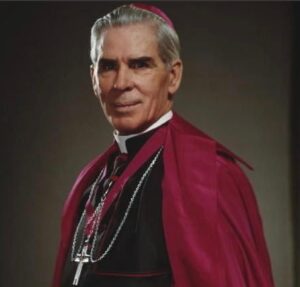Book Review: A Declaration of Dependence, by Archbishop Fulton J. Sheen

A telling feature of all the Catholic social and moral commentary I’ve ever read is that it all could have been written yesterday. Whether 10 years old, 100 or 500 years old, the truth does not change; it applies to today’s problems as perfectly as it did at the time of the writing.
Case in point: A Declaration of Dependence, by Archbishop Fulton Sheen. First published in 1941, Sheen wrote this just prior to the U.S. formal entry into World War II. As one might expect from a lover and follower of Christ and a solid American patriot, Sheen lambastes Hitler. He lambastes Mussolini. And he doesn’t stop there. He lambastes Stalin, who was our ally in the war and routinely given a moral pass, But he saves his most excoriating critique for the people of the United States and European democracies.
It must have taken enormous courage to write such a book at a time when Americans were being whipped into a patriotic frenzy, at a time when it seemed crystal clear to anybody with a brain that the Nazis were evil incarnate and the Allies were the only hope for salvation.
But Sheen does not go along with; he does not think we are the good guys, not by a long shot. He observes that the difference between the fascists, communists, and democracies is a difference of degree, not a difference of kind. Why? Because the fascists, the communists, and the democracies have all turned their backs on God, and having done so, are all walking down the same road to ruin, albeit at a different pace. For he says:
“The industrial and social injustice of our era is the tragic aftermath of democracy’s overemphasis on freedom as ‘the right to do whatever you please.’ No: freedom means the right to do what you ought, and ought implies law, and law implies justice, and justice implies god. … Whenever there is justice, there is freedom; but where there is freedom, there is not always justice.”
Prophetically, Sheen goes on:
“That is America! We are ready to condemn the world of Hitler, the flesh of Mussolini, but not the devil of Stalin. Mark these words: The enemy of the world in the near future is going to be Communism, which is using peace when it can and war when it must, and which is preparing, when Europe is exhausted from war, to sweep over it like a vulture to tear its flesh. When Russia falls, America will be the new seat of Communism.”
Let that sink in. Think about the social and political atmosphere in this country, especially over the last 10 or 15 years. Think about what is being taught in our public schools and our universities. The Archbishop’s prediction has absolutely what has come to pass.
What is to be done?
“The choice is clear: we will as a nation either go back to God and the moral law and faith in Christ, or we will rot from within. In exiling God from our national life, our politics, our economics, and our education, it was not His Heart we pierced — it was America we slew! May God forgive us!”
From these quotes you may get the impression Sheen is doing nothing more than indulging in an extended emotional rant. Far from it. In the book, Archbishop Sheen systematically explains the differences between a just and an unjust war, the specific ways in which turning away from God has weakened and endangered our souls and civilization, and specific ways we can reverse the downward spiral.
It would be hard to imagine any book more worth reading today.
The world is a horror show in 1940. Archbishop Sheen justly chastises those who ask, why does God allow these horrors to occur?
“To all who ask, ‘Where is God now? may I ask: Where are your gods now? Where is your god of science? Your god of progress? Your god of man? In them you trusted, but not in the true God of justice and mercy. Did you ever think of God before this war started? Did you just begin to think of Him because you wanted someone to blame? Did you, int he days when He blessed you with prosperity, ever thank Him? Did you ever pray to Him? Did you ever acknowledge your dependence on His Sovereign Power? Do you think of Him now only because your heart aches? And do you blame Him now for the heartache that comes naturally because, in better days, you were not clean of heart? But even though you think of God only now, He will not reject you: ‘If you turn to the Lord with all your heart, put away the strange gods from among you … he will deliver you’ (1 Sam, 7:3).”
We like to blame other people for our problems and for the world’s problems. In our more noble moments we realize how foolish this is. But the Archbishop alerts us to the fact we make the same mistake with God, only worse. We turn our back on Him, and then blame Him for not jumping to attention when We need Him. We assert our freedom at the top of our lungs, and then blame Him for the consequences of what we have freely chosen. So again, the Archbishop says,
“Whenever there is justice, there is freedom; but where there is freedom, there is not always justice.”
What, then, is justice? Who discerns justice, and how? Archbishop Sheen answers these questions in the final chapter of the book — you will have to read it to find out.
